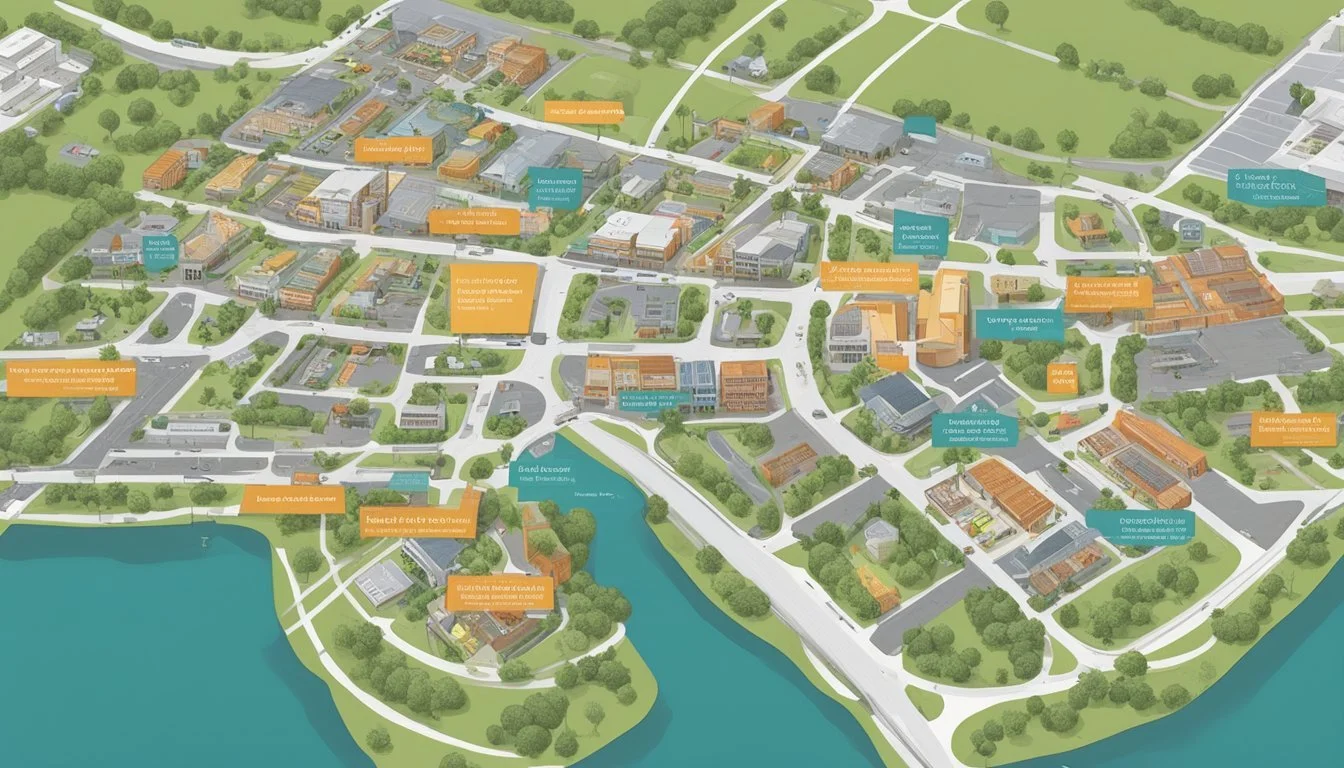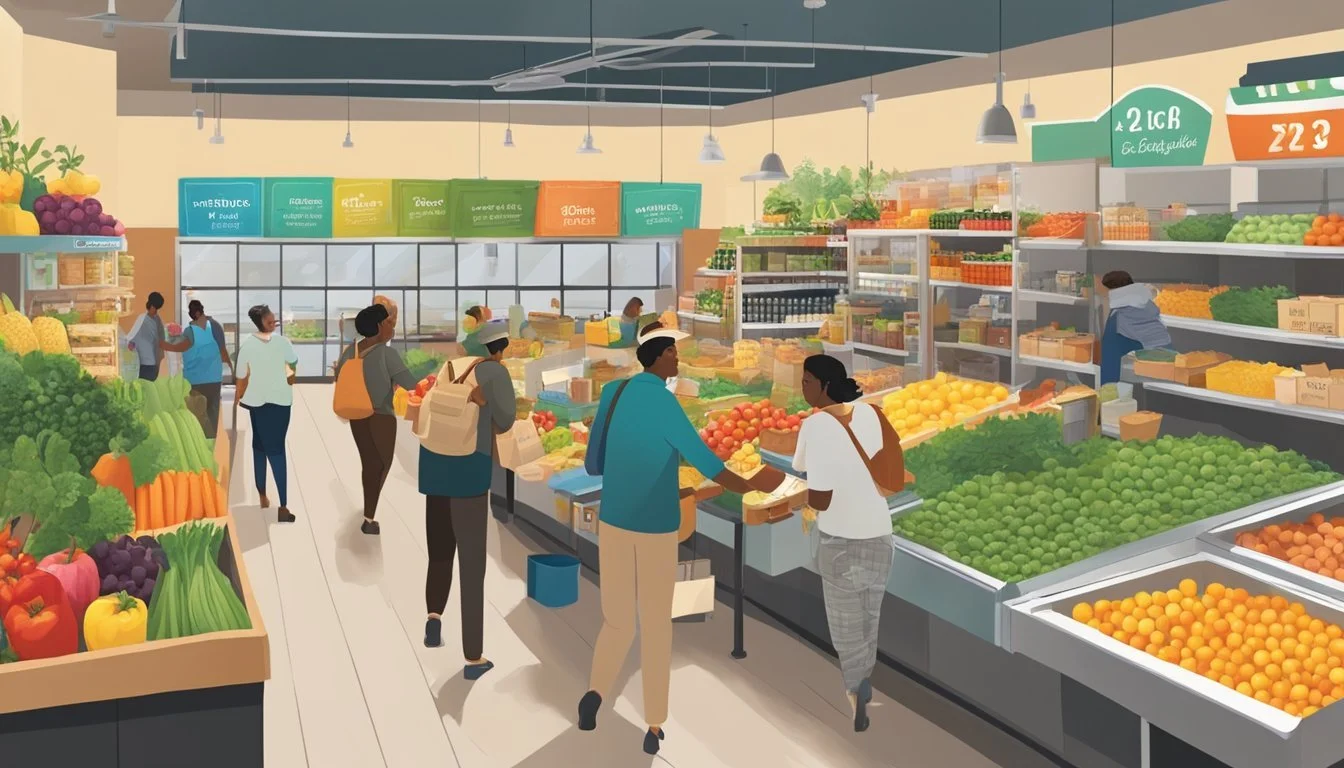Guide to Food Co-Ops in Jacksonville, FL
Your Local Shopping Guide
Jacksonville, Florida, has become a burgeoning spot for those interested in cooperative and health-conscious food shopping. Food co-ops, known for their model of operation that allows members to have a say in the business and often focuses on local and organic products, are gaining popularity in this vibrant city. They offer a community-oriented alternative to traditional supermarkets, providing consumers with locally sourced, often organic produce, and a variety of natural food products.
Within the landscape of Jacksonville's food scene, these co-ops are not just places to purchase groceries; they represent the growing trend of mindful eating and community involvement in food sustainability. Establishments like Grassroots Natural Market in Riverside exemplify the dedication to health-minded selections and local offerings, with the benefits of delivery and curbside pickup adding convenience to the conscientious shopping experience.
Moreover, new enterprises such as The Co-op Frosé and Eatery are introducing novel concepts to the downtown area, indicating a rise in innovative food ventures that cater to both the epicurean and the socially responsible patron. Together, these food co-ops and local food businesses are expanding Jacksonville's reputation not just as a culinary destination, but also as a hub for those passionate about food justice, local agriculture, and equitable business practices.
Understanding Food Co-Ops
Food cooperatives in Jacksonville offer a unique blend of community-driven retail with a focus on healthy and organic products. They are defined by community ownership and aim to cater to the local population's grocery needs.
Definition and Principles of a Co-Op
A food cooperative, or food co-op, is a grocery store that is collectively owned by its members, who are typically local consumers. The core principles revolve around voluntary and open membership, democratic member control, member economic participation, autonomy, education, cooperation among cooperatives, and concern for community. Food co-ops focus on providing a diverse selection of products, often emphasizing healthy and organic options.
Benefits of Joining a Food Co-Op
Individuals who join a food co-op in Jacksonville become part of a community that values sustainability and health-conscious living. Membership in a co-op typically provides several benefits:
Access to fresh, locally-sourced food, often organic
A say in the product selection and business decisions
Potential financial benefits like discounts or patronage refunds
History of Food Co-Ops in Jacksonville
Jacksonville's history with food cooperatives reflects the city's dedication to community and sustainability. Food co-ops within the state have evolved from simple buying clubs to full-service grocery stores. This growth mirrors a national trend where food cooperatives have become a staple in providing access to nutritious food in a community-oriented environment.
Locations and Accessibility
Access to food co-ops in Jacksonville, Florida, is straightforward and convenient for residents and visitors alike. These community-centric spots offer a range of grocery items and local produce with a focus on sustainability and support for local farmers.
Food Co-Op Locations in Jacksonville
Downtown: The up-and-coming Co-op Frosé & Eatery will be situated in Jacksonville's downtown area, specifically integrated into the adaptive reuse project at 218 W. Church St. This significant addition is poised to enhance the growing urban core with quality food options.
Riverside: Grassroots Natural Market is a well-reviewed health-oriented grocery store located in the Riverside neighborhood, delivering an array of natural foods and products.
Neighboring Areas:
The Jacksonville Farmers Market provides a wide variety of produce and is known as one of the oldest farmers markets in Florida, serving the community enthusiastically.
Nearby Co-Ops outside Jacksonville
Orlando, FL: Residents looking for food co-ops while visiting nearby Orlando will find an assortment of natural food stores and co-operative markets catering to health-conscious consumers and those seeking organic options.
Regional Scope: Those venturing out further within the region to places like South Carolina, North Carolina, and Tennessee have a network of co-ops emphasizing community-building and sustainable living, a testament to the widespread adoption of the co-op model.
Community members can refer to local maps for specific zip codes and locations to determine the closest co-ops and markets in relation to their neighborhood.
Membership and Participation
Joining a food co-op in Jacksonville, FL offers members access to high-quality, often locally sourced produce and goods. Membership typically involves a financial investment and participation, which can vary from co-op to co-op.
How to Become a Member
To become a member of a Jacksonville food co-op, individuals typically must:
Visit the location: Potential members should stop by the co-op to understand the offerings and ethos of the store.
Complete a membership application: This form gathers necessary personal information.
Pay a membership fee: A typical fee structure might include a refundable investment plus a join fee.
For families interested in joining, a buying club option like Dirt Road Organics might be suitable, offering organic produce and pastured meats through a community-based system.
Roles and Responsibilities of Members
Members of a food co-op have various roles and responsibilities:
Financial contribution: Members usually pay an annual fee or a one-time investment which funds the operation and growth of the co-op.
Participation in decision-making: They often have a say in the governance of the co-op, ensuring it aligns with their values.
Members might also receive discounts or other benefits in return for their investment and involvement. Staff may include both paid employees and volunteers, with the latter often being members themselves who want to offer helpful support to the co-op community.
Products and Services
Food co-ops in Jacksonville, FL, offer a range of products and services that cater to the community's needs for healthy, sustainable, and locally-sourced food options.
Available Produce and Organic Offerings
Food co-ops in Jacksonville provide a diverse selection of produce, ensuring customers have access to fresh fruits and vegetables. Organic offerings are a staple, with co-ops often sourcing from local farms. Customers can find organically grown vegetables and fruits, as well as grass-fed meats and pastured dairy products, including milk, cheeses, and yogurts. Moreover, those interested in seafood can find wild-caught options, emphasizing the co-ops' commitment to both health and environmental sustainability.
Additional Co-Op Services
In addition to offering a variety of grocery items, Jacksonville food co-ops often include bulk items, such as grains and beans, which cater to those looking to reduce waste and purchase in larger quantities. These co-ops frequently provide convenient services like home delivery and curbside pickup, making it easier for members and customers to access their products. Additionally, some co-ops extend their services to include retail suites or restaurants, offering prepared foods and wellness products, thus serving as vital community hubs for not only grocery shopping but also for social interaction and community building.
Food Co-Ops Community Impact
Food co-ops in Jacksonville, FL, are not just retail hubs; they are integral to community development and local agriculture. These cooperative entities have a distinct impact on both the economy of the city and the livelihood of local farmers.
Supporting Local Farmers
In Jacksonville, food co-ops support local farmers by providing a steady market for their produce. This mutually beneficial relationship ensures that farmers can rely on a consistent demand, while co-ops offer community members access to fresh, locally-sourced foods. By prioritizing local produce, co-ops help to sustain regional agriculture and maintain farming as a viable profession within the community.
Key Contributions to Local Agriculture:
Regularly purchasing from local farms
Providing farmers with dependable revenue streams
Ensuring farmland remains productive and cultivates biodiversity
Economic Contributions to the City
The influence of food co-ops extends beyond agricultural support, as they provide economic contributions to Jacksonville. Financially, they stimulate local economy through job creation and by circulating money within the city. Food co-ops also often engage in philanthropy, donating funds to local organizations and community projects, which helps in fortifying the social fabric of the area.
Economic Impact Highlights:
Job Creation: Hiring local residents, contributing to lower unemployment rates
Community Support: Donating to local causes and initiatives
Local Spending: Redirecting consumer expenses back into the city's economy
Special Features and Events
Jacksonville’s food cooperatives offer more than just groceries; they provide unique opportunities for education and community engagement. Through special events and initiatives, they foster an environment of learning and connectedness among residents.
Educational Resources and Workshops
Food co-ops in Jacksonville, like the Grassroots Natural Market, emphasize the importance of health and sustainability. They regularly host workshops designed to educate members and non-members alike on various topics, from organic food benefits to eco-friendly practices. This cooperative approach aims to empower individuals with the knowledge to make informed choices both in their diets and daily lives.
Workshop Examples:
Organic Cooking Techniques
Composting and Waste Reduction
Community-Building Events
In addition to educational resources, many food co-ops and related entities champion community-building events. For instance, the adaptive reuse of the Florida Baptist Convention building has paved the way for food-related businesses, such as The Co-op Frosé & Eatery, to host events that draw locals together. These events range from food festivals that showcase local vendors to special openings and dine-around events in revitalized spaces that encourage community interaction.
Event Highlights:
Jacksonville Food Festival: Over 50 local food vendors, live music.
Opening Celebrations: New establishments in repurposed buildings ingrain themselves in the community by hosting grand opening events.
Development and Investments
The Jacksonville food co-op landscape is actively evolving, shaped by significant investments in the local real estate market. This includes the expansion of existing co-ops and the introduction of new players, with a focus on leveraging Jacksonville's growing urban core.
Recent Developments in Jacksonville Food Co-Ops
The Co-op Frosé & Eatery represents a fresh addition to Jacksonville's food co-op scene. It opens its first Florida location in the refurbished Florida Baptist Convention building, tapping into the city’s growing appetite for community-focused dining experiences. The opening is part of a larger $18.55 million redevelopment plan, illustrating a robust investment in the city's downtown revival.
Real Estate and the Co-Op Market
JWB Real Estate Capital is playing a pivotal role, with investments such as the conversion of the historic Federal Reserve building into a mixed-use space. This project includes residential units, with an emphasis on studio and one-bedroom apartments optimized for urban living. Similarly, other developments are offering one-bedroom apartments and creating living solutions that meet the demand from a demographic likely to engage with local food co-ops. The initiatives are set to bolster the core city area, turning it into an attractive hub for co-op ventures.
The integration of residential and commercial development is a critical factor driving the co-op market's growth. Strategic investments and reconceptualizing spaces to meet the demands of community and commerce stand as a testament to Jacksonville's dynamic approach to urban development.






